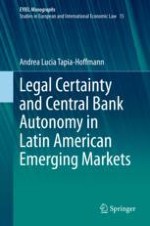2021 | OriginalPaper | Chapter
3. Legal Certainty and Legal Commitment Mechanisms
Author : Andrea Lucia Tapia-Hoffmann
Published in: Legal Certainty and Central Bank Autonomy in Latin American Emerging Markets
Publisher: Springer International Publishing
Activate our intelligent search to find suitable subject content or patents.
Select sections of text to find matching patents with Artificial Intelligence. powered by
Select sections of text to find additional relevant content using AI-assisted search. powered by
